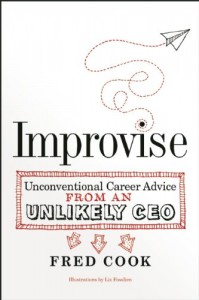Continued from the previous post:
Nicole Dobrzynski, Global Football Brand Manager at Nike
“I find my creative inspiration when I am least expecting it. I find that if I sit too long at my desk and try to force an idea, it is hard to land on something compelling. It sounds cliché coming from someone who works at Nike, but inspiration usually finds me when I am out being active – playing soccer on the weekends, taking a yoga class on a Tuesday night, etc. Maybe this habit has been formed from years of playing soccer, but it always seems to happen for me. When my mind is not forced to think about something, random thoughts tend to come in that are different from a concentrated thought.
I also recently read an article that stated that the best creative thinking happens at night. The theory is that your mind is the most tired at this point, which allows the brain to bypass normal logic and think in new and interesting ways. Whether this is completely factual or not, I like to think that there is some truth to this thought. This would help explain why I am able to weave together a seasonal concept in the span of a 60 min evening yoga session, when I have been thinking about it for the past eight hours at work with little success of finding clarity.”
Tony Telloni, Managing Director at Golin NYC
“I think the key to any good creator is the skill of observation. There is creativity in just about anything and everything you come across. You have to be willing to look at things a little bit differently and embrace the thinking that comes with it. At Golin, we like to take creative field trips. We’ll go to a museum opening or an art exhibit. We’ll know that an event is happening at Times Square or Grand Central Station, and we’ll make a point of all going down to see it, even if it’s not an event that’s run out of our office. We do that to keep our creative skills sharp and go where we know you’re going to find sources of creativity and inspiration. I think, willingness to share what inspires you with others is another really important factor and lets great ideas grow to even greater ideas.”
Ben Roth, SVP Creative at MKTG Inc.
“I think you have to be an explorer and open up your frame of reference. You have to read things…things that you don’t want to read in order to explore different points of view. I also believe that in our business, you have to ask the obvious questions that most people think – they already have a simple answer to them. Even if you don’t ask them out loud, ask them to yourself, write them down, look them up – and learn.
Many times, people come in my office, and we have long conversations. I’ll bring up one topic, after another topic, and another. Often they ask me: ‘How come you know that kind of stuff?’ It’s easy. Every day, I write down questions I have, I think about them, look them up – and I ‘learn’ them. I am not smarter than anyone else but I created a ritual for myself that if I don’t have an answer, I’m not satisfied – I look it up and I write it down. The same goes for words. If you come across a word and don’t know its meaning, write it down and look it up. When I started my career and just came out of school, I had little notebooks full of words I didn’t know, full of things I’ve learned. It’s about creating that routine for yourself.”
Inspiration is powerful; on that we can agree. Not surprisingly, there isn’t a simple recipe to it. First and foremost, it’s about finding a balance that works for you; discovering what and who inspires you. It’s about exploring the world, being receptive and sharing your creative journey with others. Beyond that, understanding creative blocks as part of the experience and seeing every moment, encounter and place as an opportunity to learn, opens new doors toward creating the unseen.
 Helma von Zadow works with the Brand and Integrated Marketing team at Major League Soccer and is a member of the PRSA New York Chapter. She served on the 2013-2014 PRSSA National Committee as vice president of professional development. Connect with her on LinkedIn or Twitter.
Helma von Zadow works with the Brand and Integrated Marketing team at Major League Soccer and is a member of the PRSA New York Chapter. She served on the 2013-2014 PRSSA National Committee as vice president of professional development. Connect with her on LinkedIn or Twitter.








